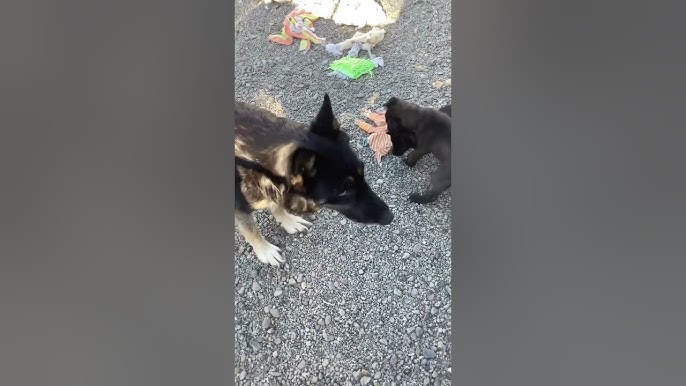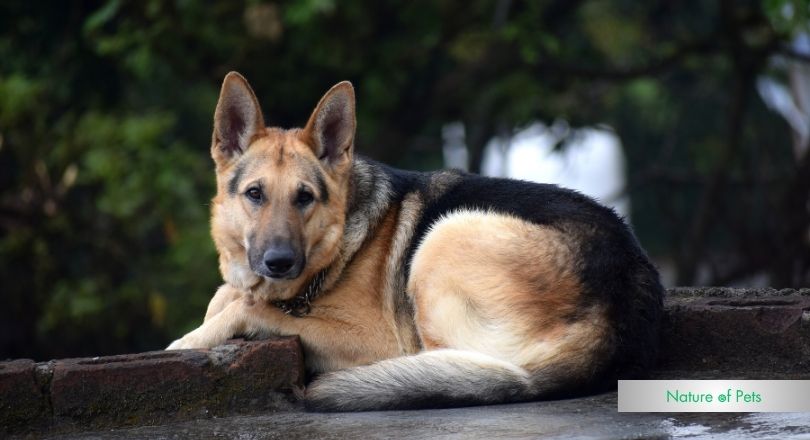Potty training your German Shepherd can feel like a big challenge. You want your dog to learn quickly and avoid accidents in your home.
The good news is, with the right approach, you can make this process smooth and even enjoyable for both you and your dog. Imagine having a well-trained pup who knows exactly where to go when nature calls—no more stress, no more mess.
Ready to discover simple, effective steps that will get your German Shepherd potty trained in no time? Keep reading, because your journey to a cleaner home and a happier dog starts here.

Credit: www.youtube.com
Preparing For Potty Training
Potty training a German Shepherd takes patience and care. Preparing well helps your dog learn faster.
Before you start, set up a good plan. This makes training easier for both you and your dog.
Choosing The Right Spot
Pick a spot outside where your dog can go potty safely. It should be quiet and easy to reach.
Using the same spot helps your dog know where to go. The smell guides them back there each time.
Gathering Essential Supplies
Have all the supplies ready before training starts. This keeps the process smooth and stress-free.
- Leash to guide your dog outside
- Cleaning wipes for accidents
- Potty training pads for indoor use
- Treats to reward good behavior
- Timer or clock to track breaks
Setting A Consistent Schedule
Feed your German Shepherd at the same times every day. This helps predict when they need to go out.
Take your dog to the potty spot often. Regular trips reduce accidents and build good habits.
- First thing in the morning
- After meals and naps
- Before bedtime
- Every 2-3 hours during the day
Effective Training Techniques
Potty training a German Shepherd requires patience and consistency. Using the right techniques can make the process easier.
Understanding your dog’s needs helps you teach them quickly. Training with care builds a strong bond.
Using Positive Reinforcement
Positive reinforcement means rewarding good behavior. This encourages your dog to repeat the action.
Give treats, praise, or playtime right after your dog goes potty outside. This helps them connect the reward to the action.
- Use small, tasty treats
- Praise with a happy voice
- Give rewards immediately
- Be consistent every time
Recognizing Potty Signals
Watch your German Shepherd closely for signs they need to go out. Acting quickly prevents accidents.
Common signals include sniffing, circling, or whining. Learning these signs helps you take your dog outside in time.
- Sniffing the floor or walls
- Restlessness or pacing
- Circling before sitting or squatting
- Whining or barking
Implementing Crate Training
Crate training helps your dog learn bladder control. Dogs avoid soiling their sleeping area.
Choose a crate that fits your German Shepherd comfortably. Use it for short periods and increase time slowly.
- Place the crate in a quiet area
- Make it cozy with bedding
- Let your dog enter and exit freely at first
- Use the crate after meals and naps
- Take your dog outside right after crate time
Handling Challenges
Potty training a German Shepherd can be tough at times. You might face accidents and stubborn behavior. It helps to know how to handle these challenges well.
Training needs changes depending on if your dog is a puppy or an adult. Understanding these differences can make the process easier.
Managing Accidents
Accidents are normal while potty training. Stay calm and avoid scolding your dog. Clean the area well to remove smells that attract your dog back.
Watch for signs your dog needs to go. Take them outside often, especially after eating or waking up.
- Use enzymatic cleaner to remove urine odors
- Keep a regular schedule for bathroom breaks
- Reward your dog immediately after going outside
Dealing With Stubborn Behavior
Some German Shepherds may resist potty training. Stay patient and consistent. Use positive reinforcement to encourage good habits.
Avoid punishment; it can make your dog afraid and slow progress. Try breaking training into small, easy steps to build success.
- Give treats and praise for correct potty spots
- Keep training sessions short and frequent
- Ignore accidents without anger or shouting
Adjusting Training For Puppies Vs Adults
Puppies have smaller bladders and need more bathroom breaks. They learn faster but need gentle guidance. Adults may have bad habits to change.
Be patient with adults. They need time to adjust. For puppies, watch closely and take them out often. For adults, use clear commands and reward progress.
- Puppies: Take outside every 1-2 hours
- Adults: Establish a regular bathroom schedule
- Both: Use the same potty spot to build habit
- Puppies: Use crate training to help control accidents
- Adults: Be consistent with commands and rewards

Credit: www.youtube.com
Maintaining Long-term Success
Potty training a German Shepherd takes time and patience. Keeping your dog trained over the long term is important.
Consistent habits and careful attention help your dog stay well-trained and happy.
Establishing Routine Habits
Create a daily schedule for bathroom breaks. Take your dog out at the same times every day.
Regular times make it easier for your German Shepherd to learn when to go outside.
- Take your dog out after meals and naps
- Use a consistent bathroom spot outside
- Praise your dog immediately after they go
- Avoid long gaps between bathroom trips
Socializing And Outdoor Training
Expose your dog to different people and places. This helps them feel comfortable outside.
Training outside is easier if your dog is relaxed and curious about the world around them.
- Take walks in new areas regularly
- Let your dog meet other dogs and people
- Practice bathroom breaks in varied outdoor spots
- Reward calm and focused behavior outdoors
Monitoring Health And Behavior
Watch your dog’s health closely. Changes in bathroom habits can signal problems.
Keep track of any accidents or changes in behavior. Address issues early to keep training strong.
- Check for signs of illness or discomfort
- Note any sudden accidents or avoidance
- Consult a vet if bathroom habits change
- Keep training consistent during health issues

Credit: www.youtube.com
Frequently Asked Questions
What Is The Best Age To Start Potty Training?
Start potty training your German Shepherd at 8-12 weeks. Early training helps develop good habits.
How Long Does Potty Training Take?
Potty training can take 4-6 months. Consistency is key for successful training.
What If My Dog Has Accidents Indoors?
Clean accidents immediately. Use an enzyme cleaner. Avoid punishment. It helps your dog learn faster.
How Often Should I Take My Puppy Outside?
Take your puppy outside every 2-3 hours. Consistent bathroom breaks reinforce good habits.
Can I Use Puppy Pads During Training?
Yes, use puppy pads for backup. They can help during harsh weather or nighttime emergencies.
Conclusion
Potty training a German Shepherd takes patience and time. Consistency helps your dog learn faster. Use positive rewards to encourage good behavior. Keep a regular schedule for bathroom breaks. Accidents will happen; stay calm and patient. Clear communication makes training easier for both.
Soon, your dog will understand where to go. Enjoy the process and build a strong bond. Training your German Shepherd is a step toward a happy home. Stay dedicated, and success will follow.

